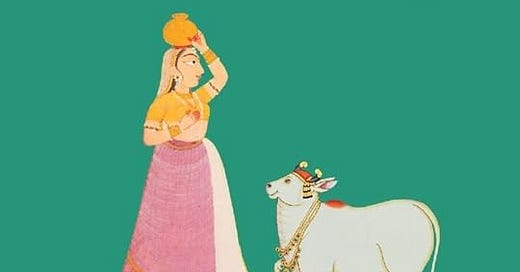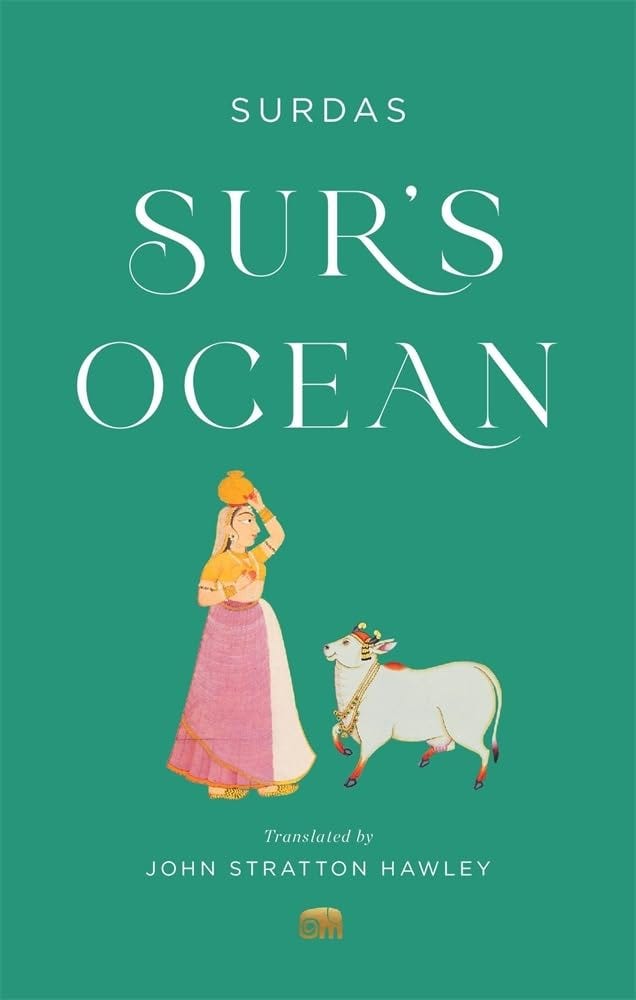Review: Sumana Roy on Surdas
The word for “philosophy” in many Indian languages is darshan. It also means “seeing.” That philosophy—which was once also kavya, poetry—is related to seeing is such an obvious declaration that to imagine a poetry by those denied sight seems to have become a minor tradition in most literary cultures. Homer and Milton, Dirghatamas and Borges … (It feels wrong to use the word “blind”; when I use it here, it’s implied that I’m using it in quotes.) Creation without vision seems neither to be an ideal nor practically plausible, which is perhaps the reason why the human imagination could not conceive of a blind god. Imagine a blind god, for a moment, as creator of the universe.
Consider Surdas, then, of the sixteenth century—a contemporary of Shakespeare—his name meaning servant (“das”) of the sun (“sur”), serving the source of light even though he was blind. His language, Brajbhasha, of the Braj region, running from Delhi along the Jamuna, the river of Krishna’s childhood. John Stratton Hawley, through whose translations we meet Surdas in a new edition from Murty Classical Library of India, introduces him with a well-circulated passage:
The sun is Sur; Tulsi, the moon;
Keshavdas, the stars.
Today’s poets are little more than fireflies
flickering here and there.
Hawley explains that among the poets who achieved pre-eminence in the major strands of classical Hindi—Brajbhasha, Tulsidas, Kabir—many were remembered for their devotion or their exploits, but “when the subject was poetry itself, Surdas had no peer.” Surdas, to whom a body of work came to be attributed that was so large and various it was called “an ocean”—“Sur Sagar,” an ocean of songs, eight thousand of which perhaps are still sung—has been understood for many generations to have been blind. To his blindness, Hawley continues. was attributed the clarity of his spiritual insight. In one version of his story, Sur was granted a vision of Krishna and then requested the deity to remove his faculty of sight so that whatever he might see subsequently would not dilute the splendor of what he had witnessed. In another, Sur is blind from birth.
Milton wrote that he was called “To serve … my Maker, and present / My true account, lest he returning chide; / ‘Doth God exact day-labour, light denied?’’’ This impulse, to accept and associate blindness with “the Maker,” marks the tradition’s poetics.
The centrality of sightlessness and gifts of sight to how we remember Surdas makes me notice how many of his compositions begin with the word “look”:
Look, just look at Nandanandan’s face— / Each of its parts as lovely as a rising sun, shaming the moon
Look, what an ocean of beauty!
The beauty of Lord Hari’s eyes: / when I think of it in my mind, they make it seem / the lotus is worshipping the sun
The water tumbles down the face / as if before one’s eyes one saw the Ganges fall
I read these passages as philosophical questions—not about sight alone but the eyes, their function, what they can see and what they can’t see, what they are supposed to see and what they don’t. What is the difference between Hari’s eyes and Surdas’s? Don’t the eyes of the poem worship Hari like “the lotus is worshipping the sun”?
“Oh, those eyes’ beguiling ways!—,” exclaims Radha of her beloved, Krishna, in a poem Hawley groups with “The Pangs and Politics of Love.”
In an epic contest of happy, loving moods
that the eyes have won by blooming day and night.
Wagtails, fish, deer—when she considers
such metaphors as these, she despairs:
“Charming to behold,”
“Quick their darting looks”—
No. No thought fits.
“Let the eyelids drop for a moment’s blink
and an instant passes like an age …”
So does Radha, taster of Sur’s Lord moods,
rail at his eyes’ propensity to close.
Radha, like a poet, searches for a metaphor for Krishna’s eyes, but she gives up. The eyes with which he sees her are also the source of her joy, bountiful and indescribable.
Surdas’s poems are a continuation of the tradition of Krisha stories, the cosmography that has, in its many versions and variations, defined the spiritual life of the Indian subcontinent. Krishna, god, the eighth avatar of Vishnu, is worshipped both as child, Bal Gopal, and as adult, the charioteer and the force behind the Bhagavad Gita, perhaps the most important literary, religious, and political text in the culture, in which his answers to a series of questions have been understood as a conversation between atman and brahman, individual self and supreme self. Krishna is also cowherd, prankster, lover, his name meaning “dark,” “dark blue,” and “attractive,” and it is this that marks his uniqueness—his infallibility, his vulnerability, making him the most human of gods. He has many names—in the eastern state of Odisha, for instance, he is Jagannatha, the reason Chaitanya, the saint-poet, makes a long journey on foot, to see him in the temple in Puri. (I remembered my classmate’s grandmother telling me why the gods at the Jagannath temple in Puri had such large eyes. Eavesdropping on a story from outside a closed door, Krishna, his brother Balaram, and their sister Subhadra were so transfixed that their eyes began to grow and their bodies shrink. I share this here just to remind you of the ancient relation between the eyes and story, both telling and listening.) Jagannatha’s eyes are said to stand for the sun and the moon—this repeated invocation of both sources of light and what they can illuminate is a tradition of thought that is peculiar to the subcontinent. And this thinking, which gives breath to Surdas’s songs, marks the Bhakti movement, to which our “blind” poet belongs. A revolutionary movement that protested against upper-caste Hindu hegemony through poem and song, it made prayer and devotion—which is what the word bhakti means—accessible to everyone, Bhakti made it possible to laugh and sleep and eat and wander with god, with Krishna, with many Krishnas. Reading Surdas’s songs in this new translation, I am reminded, again, of how the figure of Krishna is one of the greatest achievements of the Indic imagination.
Sumana Roy’s new book, Provincials: Postcards from the Peripheries, will appear in March. We featured her arboreal reflection How I Became a Tree in Book Post in 2021. She has also written in Book Post about exhaustion and is the author of Missing: A Novel, My Mother’s Lover and Other Stories, and two books of poetry, Out of Syllabus and V. I. P: Very Important Plant. She is Associate Professor of English and Creative Writing at Ashoka University, outside of New Delhi.
🎁 What’s a present you can send at the last minute, that spreads the benefits of the reading life and doesn’t take up space around the house? A Book Post Book Bag! 📚
Book Post is a by-subscription book review service, bringing snack-sized book reviews by distinguished and engaging writers direct to your in-box, as well as free posts from time to time to those who follow us. Thank you for your subscription! Your payment supports our writers and our effort to build a common reading culture across a fractured media landscape. Please help us to grow our audience by giving Book Post as a gift, extending your subscription by referring a friend, or sharing a piece you like.
Square Books in Oxford, Mississippi, is Book Post’s Winter 2023 partner bookstore! We partner with independent bookstores to link to their books, support their work, and bring you news of local book life across the land. We’ll send a free three-month subscription to any reader who spends more than $100 with our partner bookstore during our partnership. Send your receipt to info@bookpostusa.com. Read more about Square here in Book Post. And buy a Book Post Holiday Book Bag for a friend and send a $25 gift e-card at Square with a one-year Book Post subscription!
Follow us: Instagram, Facebook, TikTok, Notes, Bluesky, Threads @bookpostusa
If you liked this piece, please share and tell the author with a “like.”



